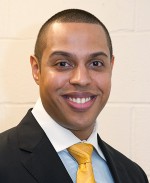Column Name
Title
After growing up on Long Island, trombonist James Burton III was a pre-med student at SUNY Stony Brook before switching to the Hartt School, where he got his bachelor’s degree in music. His postgraduate studies included an artist diploma (in 2005) and a master’s degree (in 2009) from Juilliard’s Jazz Studies program. Before joining the Juilliard faculty, in 2012, he was director of jazz studies at Snow College in Ephraim, Utah; he has also been a visiting faculty member at Hartt. Burton answered these questions shortly before embarking on a whirlwind summer performing and teaching at Juilliard jazz camps in in Atlanta and Macon, Ga. (the latter for the Georgia Academy of the Blind); West Palm Beach, Fla.; Washington, D.C.; and at Snow College. “These experiences provided us with the opportunity to hone our skills as instructors and immediately put us all in touch with the importance of sharing our talents/gifts with communities that could be considered culturally deprived,” he said. “Everyone who’s ever taught at one of these camps leaves with a renewed sense of purpose for their art.”
Body
Burton will conduct the Juilliard Jazz Orchestra concerts, on October 16, January 15, and February 21.
When did you first know you wanted to be a musician?
I first realized I wanted to be a musician when someone gave me the John Coltrane recording Blue Train. I was 14 years old and although I couldn’t describe the unbelievable feeling I got from the music, I knew that I wanted to experience that for the rest of my life.
Who was the teacher or mentor who most inspired you?
I was sort of an unusual case in that I was entirely self-taught until college. I met musicians who offered passing words of encouragement and advice, but I had no private teacher. I think National Endowment for the Arts jazz master Jackie McLean recognized this when he took me under his wing and taught me; he always stressed the importance of passing on the tradition of the music. In his eyes, performing and teaching were of equal importance. And he also gave me an opportunity to learn from trombonist Steve Davis.
What was the first recording that you remember?
I think the first music that really affected me in life was that of the band Earth, Wind & Fire. Even though I was only 3, I was completely addicted to their grooves and melodies. Also, I think the big shiny horn section in that band probably had something to do with my interest in playing a brass instrument.
What’s the most embarrassing moment you’ve had in your career?
It actually happened last year while performing in Dizzy’s Club at Jazz at Lincoln Center. They say it happens to every trombonist at least once in life: I threw my trombone slide completely off my horn in the middle of a phrase, and when that happens, you are completely powerless. You literally have to stop and go retrieve it while the audience watches.
What’s the most surprising aspect of making the transition from student to faculty?
Many of the faculty and staff members I run into still think I’m a student.
What are your nonmusic interests?
I like to work out and I love a good story, whether it’s in book, film, or television form.
What would people be surprised to know about you?
In addition to playing music, I was a total jock in high school. I played forward on the basketball team, tight end for the football team, and pitched for the baseball team. I ended up being recruited to play Division I football in college, which led me to Stony Brook. Also, bad 1980s pop music is a guilty pleasure of mine.
If your students could only remember one thing from your teaching, what would you want it to be?
I would want them to not only remember what I teach, or how I teach, but why I teach: to perpetuate a legacy that in my opinion is just as important as the music itself. Jazz was born at a time in America where opportunities were limited for certain groups of people and it was the music that allowed so many great minds/talents to elevate their condition and uplift those touched by them.
What is your favorite thing about New York City?
Its ability to inspire a love-hate relationship in so many people! Its residents (myself included) pay sky-high rent, live in tiny spaces, and endure horrific commutes to be a stone’s throw from the greatest art/culture in the world. We talk about leaving but we never do.
Which social media do you follow and why?
Facebook and Twitter. Although I myself have only four tweets to date, I do like to see what many of my colleagues are posting about their travels in music. I’ve also noticed that more and more performance opportunities are reaching me via Facebook, so I try to stay tuned in.
What are you watching these days?
The Game of Thrones series has temporarily taken over my life.
If you weren’t in the career you are in, what would you be doing?
To me, the journey itself and helping others is the most rewarding part, so I think I’d be doing something that calls for a similar level of improvisation, applied skill, and dedication. Psychiatrist? Surgeon? F.B.I. field agent? Kung-fu master? I think I’d better stick to jazz.





